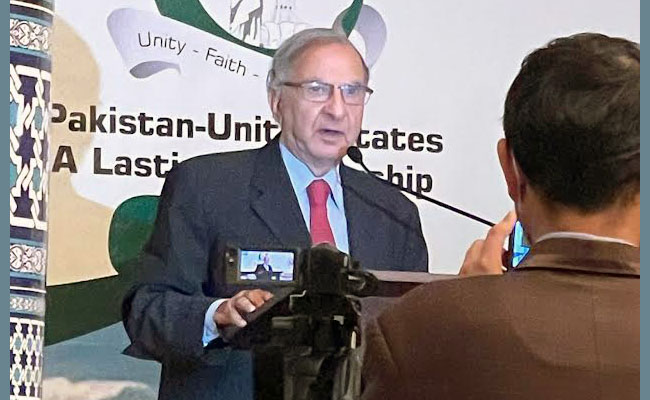The United States Policy Towards Kashmir: Past & Present

“The Kashmir conflict is often referred as potentially the most dangerous dispute in the world, as it involves the fate of 1.5 billion people of South Asia which is one fifth of total human race. Yet it is amazing that the world powers, with the United States as the sole super-power, maintains a largely leave-it-alone posture towards the problem. It is true that, at points of tension, world powers including the United States counsel restrain to India and Pakistan and warn them of the dangers of brinkmanship. Despite these warnings, hostilities do break out, conflict remains unresolved, the colossal waste of an arms race remains unavoidable, and peace is not made secure,” this was stated by Dr. Ghulam Nabi Fai, Secretary General, World Kashmir Awareness Forum during 5th International ASSAM Islamic Union Congress, held in Istanbul on December 18-19,2021
The conference was held with the participation of Üsküdar University (ÜÜ), Kütahya Dumlupınar University (KDU), Justice Defenders Association (ASDER), Union of NGOs of the Islamic World (UNIW) and Pakistan Centre for Aerospace and Security Studies (CASS), on ‘Determination of Principles and Procedures of Joint Foreign Policy for the Muslim world.’
Dr. Fai’s topic was, “The policy of the United States towards Kashmir.’ Other issues that were discussed during the two-days international conference were, ‘Islamophobia’; Afghanistan; Palestine; Lebanon; Yemen; Iraq; Syria; Libya, Sudan-Ethiopia; East Turkestan; TRNC and Eastern Mediterranean issues. 63 scholars, academics, diplomats from more than two dozen countries presented their research papers.
Dr. Fai elaborated that it was a historical fact that when the Kashmir dispute erupted in 1947-1948, the United States championed the stand that the future status of Kashmir must be ascertained in accordance with the wishes and aspirations of the people of the territory. The United States was the principal sponsor of the resolution # 47 which was adopted by the Security Council on 21 April 1948 and which was based on that unchallenged principle. Following the resolution, the United States as a leading member of the United Nations Commission for India and Pakistan (UNCIP), adhered to that stand.
“Historically, the Kashmir dispute has been the most lasting victim of the cold war, during which the Soviet Union vetoed every resolution of the Security Council to implement the Council’s agreed upon resolution. It is tragic that, even after the end of the cold war, the imbroglio has persisted, and the people of Kashmir have been subjected to grave abuses of their human rights. This is a fact which should weigh heavily on the international conscience. It should also be a challenge to international statesmanship,” Fai added.
Fai warned that an indication of the misplaced focus of the world powers including the United States is the wrong-headed talk about the “sanctity” of the line of control in Kashmir. It is forgotten that this line continues to exist only because the international agreements which had been concluded between India and Pakistan, with the full support of the United States. This line was originally formalized by that agreement as a temporary cease-fire line pending the demilitarization of the State of Jammu and Kashmir and the holding of a plebiscite under impartial control to determine its future. To regard this line as a solution is to regard disease as remedy. Any kind of agreement procured to that end, whether by the U.S. or under its influence, will not only not endure; it will invite resentment and revolt against whichever leadership in Kashmir will sponsor or subscribe to it.
Fai said that it was hard to understand why, contrary to its traditional principled stand on the Kashmir dispute, the world powers have been in recent years treating the problem as if it were an unchartered terrain about which no road map exists. The United Nations has at its inception devoted immense labor and thought, extending over a hundred meetings of the Security Council with active U.S. participation, to its solution. The fact cannot be dismissed that the terms of settlement the United Nations worked out did elicit the signed agreement of both India and Pakistan. It may be admitted that those terms seem to be in need of revision in the light of current or emergent realities but their basis, the consent of the people of Kashmir, remains inviolable. Neither pragmatism nor morality would sanction the setting aside of that basis.
“What should be the procedure for putting the Kashmir dispute on the road to a settlement? For the United States to do so by itself would be to arouse undue suspicion as though the United States has its own axe to grind. The better way would be that United States asks the Secretary General of the United Nations, with the concurrence of the Security Council, to engage himself, directly or through a representative of high international standing, in a sustained effort of mediation which should (a) ensure that the positions of the people of Kashmir is fully taken into account and (b) aim at a settlement within a reasonable time-frame, providing for a transitional period, if necessary, for a calming effect,” Fai suggested.
“In order to quicken and strengthen the peace process, United States would definitely recommend improving the atmosphere in Kashmir by revoking the Domicile Law, which is designed to change the demography of Kashmir, releasing of all political prisoners, a full restoration of civil liberties, including the liberty to express themselves peacefully on the question of their own future,” Fai concluded.
Dr. Fai can be reached at: 1-202-607-6435. Or. gnfai2003@yahoo.com





